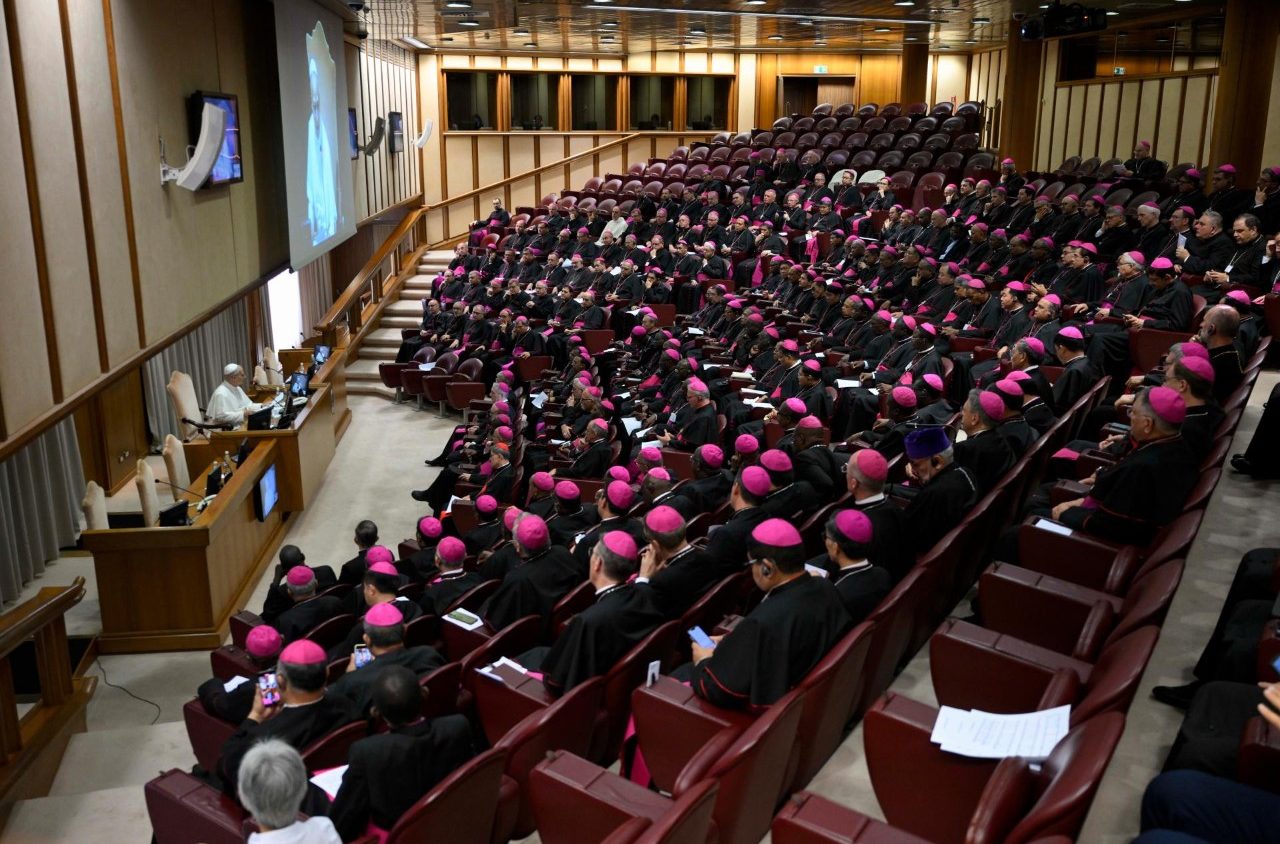Vatican City – This morning, in the New Synod Hall, Pope Leo XIV met with the bishops ordained in the past year, gathered in Rome for days of formation and prayer promoted by the Dicasteries for Bishops, for the Eastern Churches, and for Evangelization.
The encounter began in a warm and relaxed atmosphere. The Pope greeted the prelates with a smile and a touch of irony: “Good morning, good morning. Now we begin singing the Veni Creator. I believe you all have a copy. I hope someone has a better voice than mine this morning… Let us start a cappella.”
The hymn set the tone of prayer for the assembly, followed by a moment of silence and an invocation of the Holy Spirit.

«The gift you received is not for yourselves»
Entering into the heart of his address, Leo XIV immediately warned the new bishops against the risk of perceiving their ministry as a personal privilege: “The gift you have received is not for yourselves, but for serving the cause of the Gospel. You have been chosen and called to be sent forth, as apostles of the Lord and as servants of the faith.” The Pope emphasized the centrality of service as the hallmark of episcopal identity: “The bishop is a servant, the bishop is called to serve the faith of the people. This is not an external feature or a style of leadership. It is the very identity that defines us.”
Recalling St. Augustine, Leo XIV reminded them that “whoever presides over the people must understand that he is the servant of many”, and he warned them against the “desire for greatness” that even the Twelve had to learn to overcome with the Master’s help: “Whoever wishes to be great among you must be the servant of all.”
Shepherds close to their people, fathers and brothers
The Pope reiterated that the only true authority is born of humility: “I ask you always to remain vigilant, and to walk in humility and prayer, so as to become servants of the people to whom the Lord sends you.”
He added with force: “Closeness to the people entrusted to us is not an opportunistic strategy, but our essential condition. Jesus desires to draw near to His brothers and sisters through us—through our open hands that caress and console, through our words that anoint the world with the Gospel, and not with ourselves.”
In one particularly dense passage, Leo XIV painted a clear picture of what the Church expects from her shepherds: “You are sent as caring pastors, attentive and able to share the journey, the questions, the anxieties, and the hopes of the people; pastors who long to be guides, fathers, and brothers for priests and for brothers and sisters in the faith.”
The challenges of the present
References were not lacking to today’s context: the crisis of faith, the difficulty of its transmission, but also the social and cultural challenges. “The drama of war and violence, the sufferings of the poor, the aspiration of so many for a more fraternal and supportive world,” observed the Pope, “are challenges that call to us and must find in the Church a response of closeness and hope.”

A family spirit
As they left the Synod Hall, the bishops expressed their joy at the encounter with Leo XIV, noting both the Pope’s readiness to listen and the depth of his words. There were also lighter moments: with a smile, the Pope joked about his attire – “I thank the Dicastery for Bishops… I had thought of arriving for this course dressed in black myself, but…” – and playfully encouraged the prelates to take “a nice photo you can hang somewhere in your episcopal residence.”
In these first months of his pontificate, Prevost has learned—often with a touch of irony—to recognize the frenzy for photographs that now accompanies every public occasion, from general audiences to the most solemn gatherings.
The final prayer
Before concluding, Leo XIV left the bishops with a wish that sounded like a mandate: “I pray for you, that you may never lack the wind of the Spirit, and that the joy of your ordination, like a sweet fragrance, may spread also to those you are called to serve.”
The meeting ended in a cordial atmosphere, with the promise of continued dialogue and with the Pope’s expressed desire “to get to know one another a little better,” reminding them that the true strength of the Church lies not in numbers, but in the capacity for service.
d.T.A.
Silere non possum